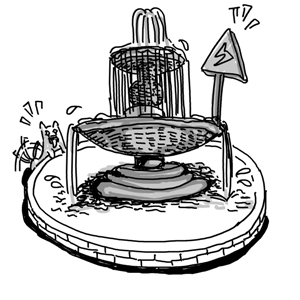
Illustration: Lu Ting/GT
A Russian expatriate was pronounced dead from multiple organ failure in Ruijin Hospital Tuesday morning after he collapsed in a public fountain in downtown Huangpu district last Friday.
It's not uncommon to hear news about foreigners dying in China or Chinese people dying in a foreign country.
It so happened that two middle school students from Zhejiang Province died in Saturday's plane crash at San Francisco International Airport on their way to a summer camp in the US. As people around the world expressed condolences to the families of the victims, local authorities have been periodically updating the public with new information as details emerge from ongoing investigations.
We know the names, school, hometown and even how well the deceased students performed at school. More importantly, we are beginning to get a clearer picture of what caused the Boeing 777 to crash and how Ye Mengyuan and Wang Linjia died. San Francisco emergency services were quick to disclose that one girl may have been killed by a fire truck and the local coroner's office set a date of two to three weeks for preliminary autopsy results to come through.
By sharp contrast, the information disclosure in the case of the Russian man's death can hardly be described as satisfactory.
One noticeable detail is that all of the Shanghai-based media, both English- and Chinese-language, don't even know the name of the Russian man. And what's more, journalists have not been able to get reasonable explanations from local police, medical staff or work safety administration authorities.
The evasive boilerplate reply we've received thus far is simply: "An investigation is underway and we will release the results soon."
But the public never knows how "soon" it will be. We are just left to wonder why the authorities persistently avoid revealing the facts to the public. We all know that according to journalism ethics, the protection of national secrets and the limitation of harm are principals that news organizations have to obey. Thus, sometimes information is not allowed to be released to the public. But in reality, the public has been repeatedly barred from timely access to information without a convincing reason.
People in Shanghai, and indeed across the country, haven't forgotten the Baoshan district killing spree on June 22 that claimed six lives and injured four others in total. Except for the basic facts which were released the next day by local police, no further information has been announced by authorities. The only way for us to learn more about the case is from sporadic media reports by journalists trying to interview sources close to either the victims or the suspected shooter. But no further information from the authorities has been forthcoming.
Life Week, an influential Chinese magazine, questioned the lack of information disclosure in its latest July 8 edition. In the article, it pointed out that several riddles have yet to be solved. What was the motivation of the killer? Where did he get the hunting rifle and ammunition? If those key questions are not answered, maybe many more tragedies await. But as of press time, nobody can even tell us when the questions will be answered.
With time passing on and more news breaking, the public still has the right to know what happened in the past.
The aforementioned cases are not isolated incidents. We still don't know about the latest developments in the school molesting case that took place in an international school and made front page headlines over a month ago.
Shanghai reportedly has the largest expat population on the Chinese mainland. It has enjoyed a long reputation for its openness. We can admit that perhaps in financial and economic fields, Shanghai has fared well compared with other major Chinese cities and has established itself as a metropolitan city. But at the same time, there is still a great deal of room for progress.
As far as foreigners are concerned, since there are many now studying, working, touring and living in the city, they should receive the same treatment as locals, but at the same time, be treated in a way that shows respect for their customs and traditions.
When something happens to a member of the expat community, they are especially eager to find out the details because being in a foreign country invariably complicates the situation. They need clear, accurate knowledge of policy and precedents.
Returning to the case of the Russian man, Shanghai residents would like to know the answer to the following questions. If the cause of death was electrocution, why was the fountain not safe? Who should be legally held responsible for his death? Are other fountains in the city similarly dangerous?
One of my foreign friends remarked, "I need to know what happened, even if I can't guarantee that I will always be safe and sound. If something similar happened to me, I just need to know all the possibilities." He isn't alone. He represents all of the foreigners here in Shanghai.
We can assume that the case is the same for Chinese people living abroad. If they encounter tragedy or accidents, they and their families need a transparent system to know how to handle the situation.
If the Earth is a global village, then all the world's citizens should feel at home regardless of where they are.
I hope that Shanghai, as a tiny spot on this village, can be governed by international rules and standards, so that both local and foreign residents know how to keep themselves safe.
The author is the managing editor of Global Times Metro Shanghai. fengyu@globaltimes.com.cn

